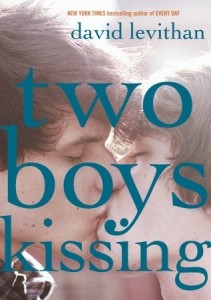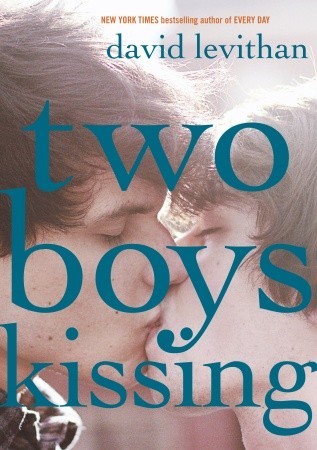 Two Boys Kissing
Two Boys Kissing
by David Levithan
Alfred A. Knopf. 200 pages, $16.99
IT HAS been just over ten years since David Levithan tossed a hot pink monkey wrench into the machinery of young adult fiction with the publiction of Boy Meets Boy, a full-on romantic comedy complete with a happy ending for its two male protagonists. Prior to that, any novel involving gay teenagers was more likely to end up at a funeral or hospital bedside. Boy Meets Boy’s originality derived from how breezily the narrative served up its high school setting, where the quarterback and homecoming queen were one and the same and went by the name Infinite Darlene. Once this book got into the water supply, things slowly began to mutate for the better.
As other authors began dismantling taboos more forcefully, Levithan continued to publish with regularity. The novels he co-authored with other YA (Young Adult) heavyweights created neighborhoods like those in a Jonathan Demme film, where not everyone is 26, white, and adorably anorexic. For example, his novel Every Day told the story of A., who woke up each morning in a new body, gender, home, and life, challenged with navigating that newness.
Two Boys Kissing tells a deceptively simple story. Two high school students, Harry and Craig, who are no longer a couple, try to break the world record for the longest kiss. Twined through their story are plot lines involving a more established couple, a couple who just met at a gay prom (one of whom is trans), and Cooper, who is alone and essentially on smart-phone life support. We follow them all for the thirty-plus hour duration of the kiss, during which time changes small and large occur.
Each character has a full and interesting back story within the novel, but the main character is arguably the narrator, a faceless chorus of “shadow uncles,” “names on a quilt that rarely gets taken out anymore,” who are still present and bearing witness to the changes since they passed on. They marvel at everything from the “infinite jukebox” of music streamed on-line to the audacity of this public kiss. (“We resent you. You astonish us.”) Their perspective on life and death underscores the plot and enlarges its context.
The kiss, which the boys enact on their high school lawn, is an act of protest on behalf of their friend Tariq, who was the victim of a gay-bashing by a group of teens. Tariq streams the kiss on-line and viewers trickle in and link to the video, and it gradually goes viral. Supporters and protesters play to the media, and eggs are flung at the boys. Their silent witnesses, our narrators, are there. “Some might think them foolish to put themselves through this, especially if they fail. But we understand the need to push beyond expectations, beyond preparation. We understand the desire to create, to step on new ground. To feel every ounce of space you are taking up in the world. To endure.” Two boys—college students—really did break the Guinness record for longest continuous kiss, which inspired the kiss in Two Boys Kissing. The novel is also noteworthy in YA for featuring trans characters (though it is not the first).
In days of yore, young adult fiction served much the same function as after-school specials when it came to educating kids about “issues” like drugs or sex. They were typified by overacting (even in—especially in—works of fiction) and if they argued for tolerance, it was done grudgingly and after great punishment had already been inflicted and endured. Progress has come from many quarters, but Levithan’s contribution is hard to quantify. Two Boys Kissing fits squarely in the young adult canon, but its appeal stretches well beyond that demographic.
________________________________________________________
Heather Seggel is a freelance writer. She lives and works in inland Mendocino County, but would rather be at the beach.






